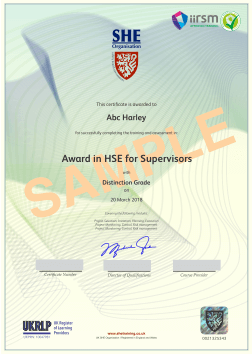The Process Safety in the Oil and Gas Industry course is designed to provide engineers, managers, and safety professionals with a comprehensive understanding of process safety management principles specific to the oil and gas sector. Participants will learn how to effectively integrate process safety practices into the organization’s overall management system, promote a culture of safety, and ensure compliance with industry standards and regulations.
The course focuses on strategic risk management, process safety leadership, regulatory compliance, and emergency preparedness tailored to upstream, midstream, and downstream operations. The course provides flexible learning (physical or online) while equipping participants with technical and managerial competencies required to uphold process integrity and operational safety.

